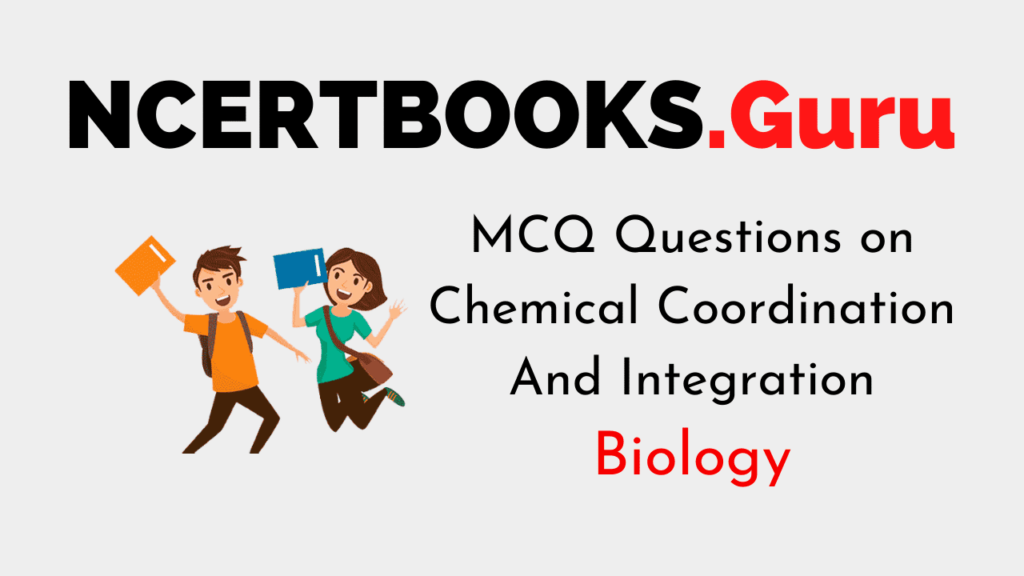MCQ Questions on Chemical Coordination And Integration
1. _______ controls the concentration of urine
(a) ADH
(b) Oxytocin
(c) ACTH
(d) None of the above
Answer
Answer: (a) ADH
2. Children who have damaged thymus may result in_____________
(a) Loss of an antibody-mediated immunity
(b) Reduction in stem cell production
(c) Deafness
(d) Loss of cell-mediated immunity
Answer
Answer: (d) Loss of cell-mediated immunity
3. A group of hormones called _____________ are released due cortex
(a) Glucose
(b) Glucocorticoid
(c) Glucagon
(d) None of the above
Answer
Answer: (b) Glucocorticoid
4. Adrenocorticotropic hormones stimulate the adrenal cortex to produce _________
(a) Testosterone
(b) Aldosterone
(c) Cortisol
(d) None of the above
Answer
Answer: (c) Cortisol
5. Deficiency of this element causes the thyroid gland to swell up
(a) Calcium
(b) Iodine
(c) phosphorous
(d) None of the above
Answer
Answer: (b) Iodine
6. _________ are synthetic steroid hormones that resembles testosterone
(a) Aldosterone
(b) Anabolic Steroids
(c) Both (1) and (2)
(d) None of the above
Answer
Answer: (b) Anabolic Steroids
7. The hormone that participates in metabolizing calcium and phosphorous are called _____
(a) Glucagon
(b) Calcitonin
(c) Glycogen
(d) None of the above
Answer
Answer: (b) Calcitonin
8. ______________ is a chemical substance that is released by an organism that can affect the behaviour of another individual of the same species.
(a) Pheromone
(b) Androgen
(c) Testosterone
(d) All of the above
Answer
Answer: (a) Pheromone
9. The deficiency of adrenal cortex hormones can lead to _______
(a) Dwarfism
(b) GERD
(c) Addison’s Disease
(d) Acromegaly
Answer
Answer: (c) Addison’s Disease
10. If too much growth hormone is released during the growth period, it can cause ________
(a) Acromegaly
(b) Crohn’s Disease
(c) Gigantism
(d) None of the above
Answer
Answer: (c) Gigantism
11. Endemic goitre relates to
(a) Increased Pancrease function
(b) Increased Thyroid function
(c) Decreased Thyroid function
(d) Decreased Pancrease function
Answer
Answer: (c) Decreased Thyroid function
12. _______ secretes glucagon hormone
(a) Thyroid gland
(b) Pituitary gland
(c) Liver
(d) Pancreas
Answer
Answer: (d) Pancreas
13. Name the hormone that is responsible for milk secretion after parturition.
(a) Insulin
(b) Prolactin
(c) Lactogen
(d) None of the above
Answer
Answer: (b) Prolactin
14. _______ is a hormone predominantly made by the adipose cells and enterocytes in the small intestine
(a) Estrogen
(b) Calcitonin
(c) Leptin
(d) Adrenaline
Answer
Answer: (c) Leptin
15. ___________ is produced by the alpha cells of the pancreas
(a) Calcitonin
(b) Glucagon
(c) Insulin
(d) None of the above
Answer
Answer: (b) Glucagon
16. _________ is a hormone produced by the beta cells of the pancreas
(a) Insulin
(b) Glucagon
(c) Glycogen
(d) Oxytocin
Answer
Answer: (a) Insulin
17. ______ is a hormone that plays a major role in social bonding, the period before and after childbirth, and sexual reproduction
(a) Oxytocin
(b) Osteocalcin
(c) Renin
(d) None of the above
Answer
Answer: (a) Oxytocin
